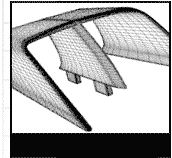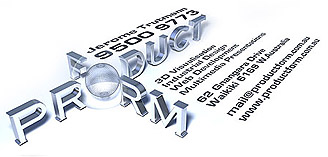You
need to get some visuals produced of something that will eventually
become real - you have these options
-
get an illustrator to draw or paint some visuals
- get
a modelmaker to produce some models
- photography
- 3D
visualisation
Now
these discipline's are all useful to the process but the conventional
methods to produce professional results are either time or labour
intensive and are limited once they are produced - changes, both
minor and major are usually expensive, complicated or have to
be reproduced entirely - except for digital 3D visualisation.
With
3D you have the cost effective options to make minor and major
changes with relative ease and have the ability to view issues
before they manifest into the final production stage - plus the
final rendered 3D object can be as photoreal as you need to demonstrate
your ideas into something that everyone can understand.
Photography
- The lower cost alternative??? Some assignments mean photography
is an expensive option - yet a photographic style is required.
3D can be the solution.
Take the product cutaway as an example. The cost (and time, and
difficulty) of physically producing the cutaway can be high, add
it to the cost of photography and you may well end up with a very
expensive solution. Why not do it digitally instead?
Three
typical examples might be:
- Producing
virtual product prototypes where visual appeal, functions (both
hidden and otherwise) and material choices can be quickly altered
and demonstrated before a real world expensive production prototype
is made - you can sort issues before they become a restriction
to your bottom line.
- Producing
product or packaging illustrations that can be printed in marketing
and sales literature - which can then be ready before production
starts - not many weeks afterwards!
-
Architectural presentations - users and approvers can actually
see what the building will look like - rather than how they
imagine it will look like. Combine such an image with conventional
site photography and your clients can be presented with a composite
illustration of the building 'in-situ' - the ideal before and
after presentation.
Digital
3D means you can see the product before you produce it, picture
the packaging before you print it and let the client view the
building before you build it - all in a very realistic style.
It means you can photograph where no photographer can go, look
from the impossible viewpoint, and see what yet doesn't exist!






